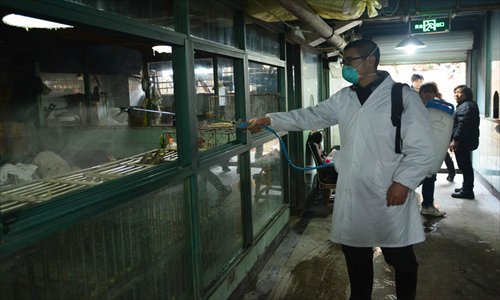Zhejiang to shut urban live poultry markets

A medical worker sprays disinfectant on a live poultry stall in Hangzhou, Zhejiang Province, on Friday as the number of H7N9 patients increases. Photo: CFP
Live poultry markets in central areas of major cities in Zhejiang Province will be permanently closed by July 1, authorities announced Tuesday.
The notification comes as operations at many live poultry markets have been suspended amid a winter spike in the number of H7N9 bird flu cases.
Zhejiang provincial government also announced that if there are epidemic conditions in any central areas of major cities or in county towns, poultry markets would be suspended for three months starting February 15.
Zhang Hongming, mayor of Hangzhou, the capital of Zhejiang, confirmed to the Xinhua News Agency Tuesday that the city is planning to issue policies that permanently shut down live poultry markets. The city will market chilled poultry products instead.
The province has seen the highest number of H7N9 cases so far this year, with 53 infections and 12 deaths by Tuesday. Of the infected patients, at least 41 had close contact with live poultry, according to a statement from Zhejiang provincial health authority.
In nearby Shanghai, authorities from Shanghai Municipal Commission of Commerce told the Shanghai-based Jiefang Daily that big cities like Shanghai will take the initiative to gradually reduce the number of live poultry markets, in line with a 2006 State Council directive.
"Permanently shutting down live poultry markets is the safest way, compared with just shutting down markets for a while," said Feng Zijian, vice director of the Chinese Center for Disease Control and Prevention (China CDC).
He noted that this is a difficult decision for local authorities as it will affect livelihoods and it necessitates a complete change in eating habits.
A sample from a Guangdong poultry supplier tested positive for H7N9 and 20,000 birds were culled in Hong Kong Tuesday.
The market will be closed for three weeks and there will be no supplies of live poultry to the city during the period, reported Xinhua.
"Some 70 percent of H7N9 patients had close contact with live poultry. From last year's experience, shutting these markets down will reduce patient numbers significantly," said Feng.